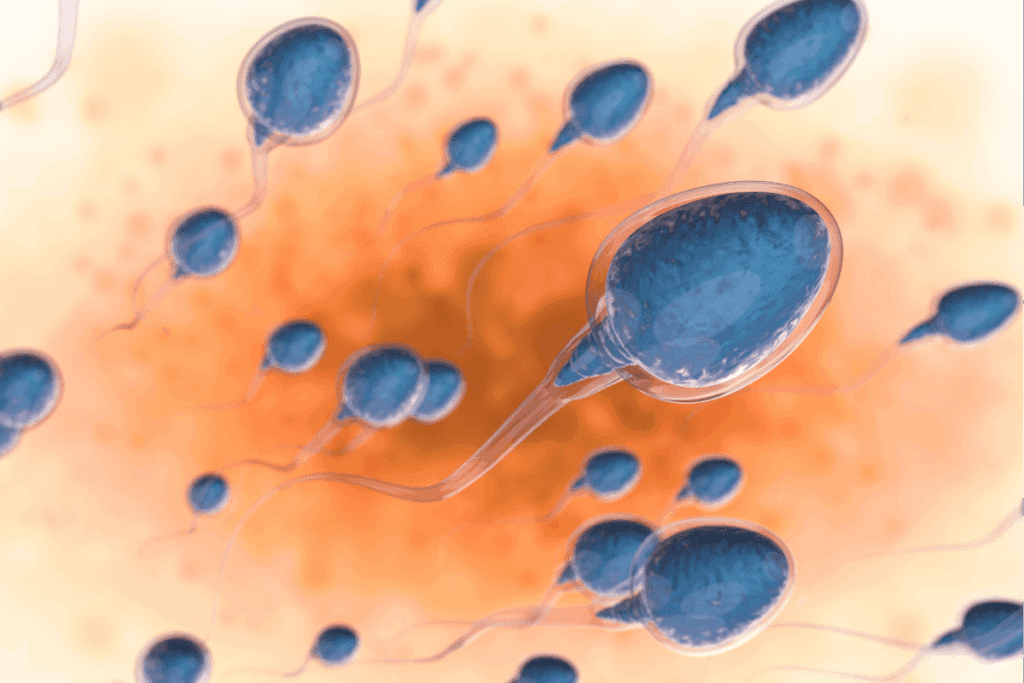Last Updated on October 31, 2025 by

Seeing a drop in ejaculate volume can worry you. But knowing the reasons and how to fix them gives you power. Low semen volume, or hypospermia, affects male fertility and reproductive health. Yet, it’s very treatable with the right lifestyle changes, medical help, and expert advice.A complete guide to addressing low volume of sperm (hypospermia), including dietary changes, hydration, and medical review.
At Liv Hospital, we know that a detailed check-up and tailored treatments are key. Normal semen volume is at least 1.5 mL per ejaculate. Things like age, how often you have sex, genetics, health issues, medicines, and lifestyle play big roles in semen volume.
Fixing low semen volume needs a broad strategy. We’ll give you a detailed guide on this topic. We’ll cover what it is, why it happens, and how to boost semen volume.

Semen volume is key to male fertility. It affects how well sperm can move and reach the egg. Knowing what’s normal and why it matters is important for men’s health.
Normal semen volume is between 1.5 to 5 milliliters. This is what health experts, like the World Health Organization, say is standard. A healthy ejaculate volume is vital for sperm transport, helping sperm meet the egg for fertilization.
Let’s look at what affects semen volume:
A healthy ejaculate volume is key for male fertility. It helps sperm move and provides nutrients for survival. Low semen volume, or hypospermia, can be a concern for men trying to conceive, as it may indicate reproductive issues.
Semen Volume Range (ml) | Description | Potential Impact on Fertility |
Less than 1.5 | Low Semen Volume (Hypospermia) | May indicate reproductive issues, potentially affecting fertility |
1.5 to 5 | Normal Semen Volume | Optimal for sperm transport and fertility |
Greater than 5 | High Semen Volume | Generally not a concern, but may be associated with other factors |
Knowing the importance of healthy ejaculate volume helps men take care of their reproductive health. Lifestyle, diet, and overall well-being affect semen quality and volume.
Low Volume of Sperm: Medical Definition and Concerns

Men’s reproductive health can be affected by many things, like low semen volume or hypospermia. We will look into what this condition means and how it affects fertility.
Hypospermia is when a man’s semen is less than 1.5 mL per ejaculation. The World Health Organization (WHO) says this is a key sign of low fertility. A normal semen volume is key for sperm to move properly during ejaculation.
On average, semen volume is between 1.5 to 5 mL. If it’s less, it might mean hypospermia. This condition can make it hard for a man to get his partner pregnant.
Many men have hypospermia, and how common it is can vary. Research shows it’s a big problem for men trying to get pregnant.
It’s important to tell the difference between low semen volume (hypospermia) and low sperm count (oligozoospermia). Both can affect fertility, but they have different causes.
Knowing these differences helps doctors diagnose and treat better. We’ll keep looking at what affects semen volume and reproductive health in the next parts.
Men need to know how their body affects semen production to stay healthy. Different things can change how much semen is made. Knowing these can help fix any problems.
As men get older, their body changes can affect semen. Studies show semen volume goes down after 40. This is because of lower testosterone and less efficient body systems.
A study in the Journal of Andrology found older men have less semen than younger ones. This change is part of aging and can affect fertility.
Hormones, like testosterone, are key for healthy semen. Low testosterone can mean less semen. Hormonal issues can come from many places, like health problems or lifestyle choices.
“Testosterone plays a critical role in making sperm and keeping male reproductive tissues healthy.”
Nature Reviews Urology
Fixing hormonal imbalances can help semen production. This might mean medical treatment or changing your lifestyle.
Body Mass Index (BMI) affects semen quality and volume. Both being too thin or too heavy can harm semen. Eating right and exercising can keep your BMI healthy and your reproductive system working well.
BMI Category | Impact on Semen Volume |
Underweight (<18.5) | Potential decrease in semen volume |
Normal (18.5-24.9) | Optimal semen production |
Overweight (25-29.9) | Possible reduction in semen quality |
Obese (>30) | Significant negative impact on semen volume and quality |
Knowing how your body affects semen production is key. Men can take steps to keep their reproductive health in check. This includes dealing with age, hormonal issues, and keeping a healthy BMI.
Many modern life aspects, like sitting too much and using substances, can affect how much we ejaculate. Our daily choices and habits are key to our health and reproductive well-being.
Smoking is bad for semen quality and volume. Studies show it can harm the reproductive system in men, leading to lower fertility. Cigarettes contain chemicals that can damage sperm DNA and reduce sperm count.
Smoking also lowers the amount of seminal fluid. This is a big concern for men wanting to boost their reproductive health.
Smoking harms seminal fluid production in many ways. It causes oxidative stress, inflammation, and direct damage to testicular tissue. Quitting smoking is key to improving health and reproductive well-being.
Too much alcohol can hurt semen quality and volume. It can mess with hormone balances needed for sperm production. It also affects the liver’s hormone regulation, making reproductive health worse.
Chronic drinking can lower testosterone levels, impair sperm production, and reduce semen volume. It’s best to limit alcohol for reproductive health.
A sedentary lifestyle can also lower ejaculate volume. Regular exercise is vital for healthy testosterone levels and reproductive health. Sitting too much can lead to obesity and metabolic syndrome, worsening reproductive issues.
Adding exercise to your daily routine can help. It boosts health, supports reproductive well-being, and improves circulation and stress levels.
In summary, smoking, too much alcohol, and a sedentary lifestyle can lower ejaculate volume. Making better choices and adopting healthier habits can improve reproductive health and semen volume.
Eating a balanced diet is key for healthy semen production. A well-nourished body helps keep reproductive health in check. We’ll look at how diet affects semen volume.
Some foods can harm semen production. High amounts of processed meats, soy, and sugar can lower semen volume. Processed foods have unhealthy fats and preservatives that can hurt reproductive health.
Too much caffeine and alcohol can also hurt semen quality. It’s important to watch what you eat to protect reproductive health.
Nutritional gaps can hurt semen production. Lack of zinc, vitamin D, and folic acid can lower semen volume. Zinc is key for testosterone and male fertility.
Eating foods rich in antioxidants, like fruits and nuts, helps reproductive health. Getting enough of these nutrients is vital for healthy semen.
Making smart food choices can boost semen volume and reproductive health. It’s about finding the right balance and knowing how food affects the body.
Nutrition is key for men wanting to boost their semen volume naturally. Eating well supports health and reproductive well-being. We’ll look at how certain foods can help increase semen production.
Certain vitamins and minerals are vital for healthy semen. Zinc is important for testosterone and sperm health. You can find zinc in oysters, beef, and chicken.
Vitamin C is also key. It protects sperm from damage. You can get vitamin C from citrus fruits, strawberries, and bell peppers.
Vitamin D and selenium are also important. Vitamin D helps with reproductive health, and selenium protects sperm. Getting enough of these through food or supplements can improve semen quality.
Nutrient | Food Sources | Benefit |
Zinc | Oysters, Beef, Chicken | Testosterone production, sperm health |
Vitamin C | Citrus fruits, Strawberries, Bell Peppers | Antioxidant, protects sperm |
Vitamin D | Fatty fish, Fortified dairy products | Reproductive health |
Selenium | Brazil nuts, Fish, Turkey | Protects sperm from damage |
Drinking enough water is often overlooked but is very important. Adequate fluid intake helps make seminal fluid, which carries sperm. Drinking water all day is recommended.
Not drinking enough can lower semen volume and affect fertility. It’s important to drink the right amount, more in hot weather or after exercise.
Antioxidants protect sperm from damage, supporting reproductive health. Foods like berries, leafy greens, and fruits and vegetables are full of antioxidants. They help reduce oxidative stress, improving semen quality and volume.
Adding these nutrition tips to your daily life can help with semen volume and reproductive health. A balanced diet, enough water, and antioxidant-rich foods support optimal semen production.
Making certain lifestyle changes can help increase ejaculate volume. By adding healthy habits to your daily life, you can boost your reproductive health. This might also increase semen volume.
Regular exercise is good for your health, including your reproductive system. It can improve blood flow and raise testosterone levels. Both are key for making more semen.
High stress can harm reproductive health by changing hormone levels, including testosterone. It’s important to manage stress well to keep semen production healthy.
Getting enough sleep is vital for health, including reproductive health. Poor sleep can disrupt hormone production. This might affect semen volume.
Sleep Factor | Impact on Semen Production |
Duration | 7-9 hours of sleep is considered optimal for hormone regulation. |
Quality | Poor sleep quality can disrupt testosterone production, affecting semen volume. |
The frequency of sexual activity and ejaculation can affect semen volume. While frequent ejaculation might temporarily lower semen volume, regular sexual activity is good for reproductive health.
By making these lifestyle changes, you can potentially improve your ejaculate volume and overall reproductive health.
Supplements and Natural Remedies for Increasing Seminal Fluid
Certain supplements and natural remedies may help increase seminal fluid. It’s important to look at the evidence and any risks they might pose.
Several supplements have been studied for their effect on semen volume. These include:
These supplements can be found in foods, but supplements may be needed for optimal levels. Always talk to a healthcare provider before starting any supplements.
Herbal remedies have been used for centuries to boost male fertility. Some popular herbs include:
While these herbs are generally safe, their effectiveness can vary. It’s important to consider any interactions with medications.
When using supplements and natural remedies, be aware of possible risks. These include:
To avoid risks, always consult with a healthcare provider before starting any new supplement or herbal remedy. They can guide you based on your health needs.
Understanding medical treatments for low ejaculatory volume is key to better reproductive health. These treatments can fix issues that cause the problem.
If you often have low ejaculatory volume, see a healthcare provider. They can find the cause and suggest treatment. They will check your medical history and do a physical exam.
Prescription meds or hormonal therapies might be needed for low ejaculatory volume. These can fix hormone imbalances or other issues.
Common prescription medications include:
Low ejaculatory volume can be a sign of a bigger health issue. Fixing this issue is key to better semen volume.
Common underlying conditions include:
After starting treatment, it’s important to track progress and adjust as needed. It’s also key to have realistic expectations, as results may take time.
Key aspects to track include:
Conclusion: Creating a Comprehensive Plan for Optimal Semen Volume
We’ve looked at many things that affect semen volume. This includes health, lifestyle, diet, and medical treatments. To get the best semen volume, you need to tackle these areas from all sides.
Creating a plan that covers lifestyle changes, diet tips, and medical help when needed is key. This way, men can boost their reproductive health and feel better overall.
For a solid plan, talk to a healthcare expert. They can guide you on the best steps. This might mean eating foods high in antioxidants and vitamins, or finding ways to manage stress.
By being proactive and well-informed, men can improve their semen volume and fertility. It’s vital to have a detailed plan for the best semen volume. We urge everyone to take charge of their reproductive health.
The World Health Organization (WHO) says a normal semen volume is 1.5 milliliters or more per ejaculation.
Low semen volume, or hypospermia, can come from many sources. Hormonal imbalances and certain medical conditions are common causes. Lifestyle choices like smoking and drinking too much alcohol also play a part. Nutritional deficiencies can also affect it.
As men get older, their semen volume often goes down. This is due to aging and a drop in testosterone levels.
Yes, a healthy lifestyle can boost semen volume. Eating well, exercising regularly, managing stress, and getting enough sleep are key.
Yes, foods high in antioxidants, vitamins, and minerals can help. Zinc-rich foods, folate-rich foods, and omega-3 fatty acids are good for reproductive health and may increase semen volume.
Some supplements, like zinc, vitamin D, and antioxidants, might help. But, always talk to a healthcare provider before taking any supplements.
If you have low semen volume that lasts or worries you, see a healthcare provider. They can check for medical issues.
Yes, treatments like hormonal therapies and medications can help. They address conditions that cause low semen volume.
Seeing improvements in semen volume can take weeks to months. It depends on individual factors.
Low semen volume can affect fertility, but it’s not the only sign. Sperm count and motility also matter.
Yes, stress can harm reproductive health, including semen volume. It can mess with hormone levels and overall health.
Drinking enough water is key for healthy semen volume. It helps in making seminal fluid.
National Center for Biotechnology Information. How to Increase Semen Volume A Complete Guide. https://pmc.ncbi.nlm.nih.gov/articles/PMC10666430/).
Subscribe to our e-newsletter to stay informed about the latest innovations in the world of health and exclusive offers!